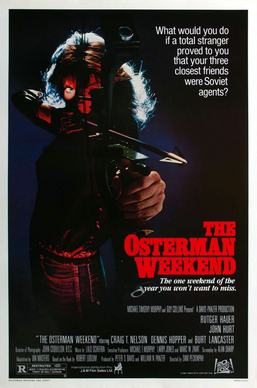In 1983, Sam Peckinpah’s *The Osterman Weekend* hit theaters as a chilling espionage thriller based on Robert Ludlum’s novel. Though the film was met with mixed reviews at the time, it has since gained recognition as a fascinating snapshot of the cultural and political anxieties that would define the 1980s. Through its themes of surveillance, deception, and media manipulation, the movie eerily foreshadowed many elements of the decade’s geopolitical and cultural landscape.
### The Rise of Surveillance and Paranoia
One of the most striking aspects of *The Osterman Weekend* is its portrayal of surveillance as an omnipresent force. The film revolves around John Tanner, a television host who is coerced by the CIA into exposing a group of his friends as Soviet spies. The story unfolds in a web of mistrust, with surveillance equipment monitoring every interaction.
This mirrors the growing paranoia of the 1980s, fueled by Cold War tensions and the arms race between the U.S. and the Soviet Union. By the mid-1980s, advancements in technology led to fears of governmental overreach, particularly with the proliferation of wiretapping and electronic surveillance. *The Osterman Weekend* captured the zeitgeist by depicting a society where privacy is an illusion, echoing concerns that would only grow with events like the Iran-Contra scandal and revelations of intelligence agency abuses.
### Media Manipulation and the Power of Television
Another prescient theme in the movie is the manipulation of media as a tool of control. John Tanner, as a television personality, represents the growing influence of media in shaping public perception. The CIA’s ability to twist narratives and use media to manipulate individuals mirrors the power television held during the 1980s.
The decade saw the rise of 24-hour news networks, most notably CNN, which began to dominate how people consumed information. Politicians and corporations also recognized the media’s power, leading to the era of carefully crafted public images, from Reagan’s Hollywood-inspired presidency to the rise of consumerism driven by advertising. *The Osterman Weekend* highlighted how media could be weaponized, a theme that became increasingly relevant as the decade progressed.
### The Culture of Mistrust and Deception
At its core, *The Osterman Weekend* is a story about mistrust. Friends turn on each other, unable to distinguish truth from lies. This resonates with the cultural climate of the 1980s, when the public began to question authority more critically. The Watergate scandal of the 1970s had already planted seeds of doubt in government institutions, and this mistrust carried into the Reagan era.
The movie also reflects the fragmented social dynamics of the 1980s. The characters’ inability to trust even their closest friends mirrors a society grappling with shifting values, including the rise of individualism and the decline of traditional community bonds.
### The Cold War’s Shadow
Finally, the backdrop of Cold War intrigue in *The Osterman Weekend* feels quintessentially 1980s. The film’s plot revolves around espionage and the specter of Soviet infiltration, a theme that dominated popular culture throughout the decade, from *The Day After* to *Red Dawn.* While *The Osterman Weekend* may have leaned into the paranoia of the time, it also offered a critique of the zero-sum mentality that defined U.S.-Soviet relations.
### A Prophetic Vision
Though not a box office sensation, *The Osterman Weekend* stands out as a film that captured the spirit of an era on the cusp of transformation. Its themes of surveillance, media manipulation, mistrust, and Cold War anxiety were not only relevant but predictive of the 1980s’ defining characteristics.
In hindsight, Peckinpah’s final film serves as a cultural artifact, offering a lens through which we can better understand the decade’s complexities. For those revisiting the film today, it’s a reminder of how art can anticipate and reflect the fears and realities of its time.

No comments:
Post a Comment